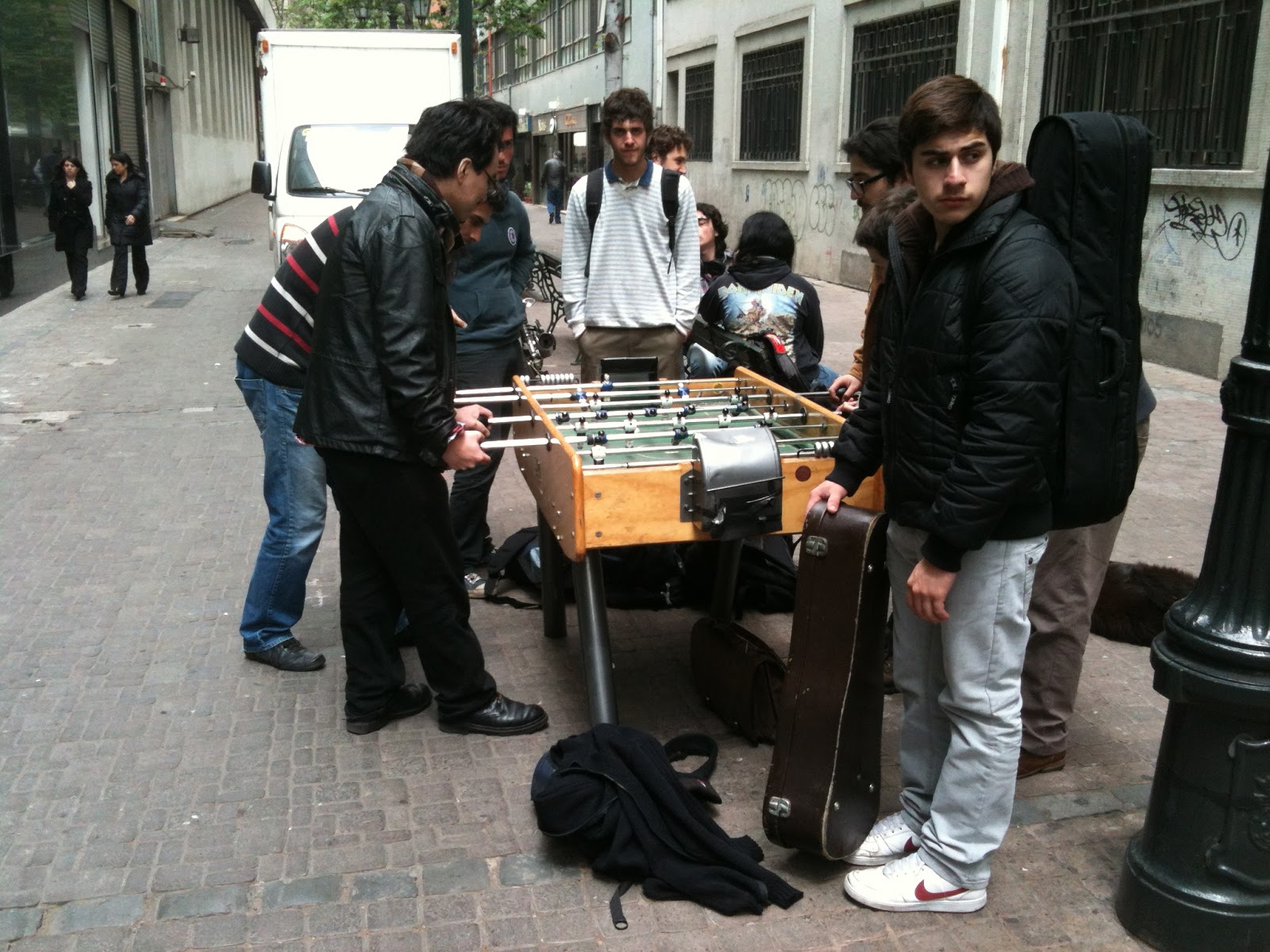I haven't done a great deal of international travel, but I'm happy to take advantage of opportunities that present themselves. Just such a one came up this past October: I accompanied two of my music professors (of composition and trombone) to Santiago, Chile, to provide tech support for an electronic music concert and to give a few brass master classes. It was an enjoyable week, getting to know just a little bit about Chile's history, culture, and people. The roots of the indigenous people and the descendants of the Spanish
conquistadores are deep, but influxes of German and Middle Eastern immigrants last century have also made their marks on the country.
The "Chicago school" concepts introduced by economists trained at the University of Chicago and adopted as policy by the Pinochet regime raised the country's international economic standing considerably while simultaneously creating widespread unemployment and poverty. The divide between rich and poor is still quite stark, and it seems that those of the middle class many times struggle to subsist. In the last few years, Chile has experienced sustained student protests demanding deep reform of the public education system. Despite the hardships, the students I met and worked with at the Universidad de Chile, all from middle class families, were very friendly, receptive to new musical concepts, and really quite fine players. I gave two master classes to the tuba studio, the first a solo class and the other on chamber playing, and did a little coaching

of the trombone choir; it was very rewarding to hear the players make progress during our short time together. I also greatly appreciated their patience with my terrible grasp of Spanish; the composition professor who was on the trip is Chilean and was on hand to translate for all the master classes, and often had to figure out how to re-translate what I had tried (and failed) to tell the students in their own language.
After all the teaching and accompanying translating that went on--the trombone teacher
at the U. de Chile managed to wring a lot out of our trombone prof,
having him give something like six or seven master classes and coachings
during our stay--the concert almost came barreling up out of nowhere. Our trombone professor
performed a piece for bass trombone and live electronics by (of course)
our composition professor as part of the
Ai-Maako Chilean
Electroacoustic Festival, which took place at several venues across
Chile over the course of a couple weeks in mid-October. Tired as we all were, the rehearsal and performance--which took place in Santiago--came off without a hitch and the piece was well received.
While we spent quite a bit of our time at the U. de Chile in downtown Santiago, it was great to get out into several other areas of the city as well. The trombone professor and I stayed in a hostel in the Los Leones neighbourhood, which has apparently moved from being primarily residential to having more of a commercial vibe in the last couple decades. The architecture in this area varies from a more Old World style of some of the remaining houses to the very modern high rises that are currently under construction. Out exploring the neigbourhood one afternoon, I discovered a multistory building that exclusively housed

tattoo & piercing parlours, skate shops, anime boutiques, and small punk/hardcore music & clothing stores. Within a block were several of the city's premier department stores. A fascinating place. Other interesting venues visited included the tenth-floor apartment of the composition professor's mother, where I experienced my first earthquake (it was just a little one, but exciting nonetheless); a quiet--and admittedly somewhat touristy--open-air market for handcrafted Chilean items; and a Communist-themed bar for a night of tango music.
Spring was just beginning when we visited, so we enjoyed a few lunches at outdoor cafés near the university or our hostel. Much of the fare was very meat and bread-centric; fairly massive hot beef and cheese sandwiches with ají--a spicy red chili sauce--were regular staples. Ordering coffee was an interesting experience; the normal cup of
café was actually instant Nescafé, so if you wanted a regular cup of coffee you would order "
café café." The favourite of our trombone professor became a
cortado ("cut" with milk). We also had many wonderful meals at the homes of our Chilean professor's family. One evening at a birthday
party we had an incredible wok-prepared shrimp curry; another night I was fed so many homemade dolmathes that it pained me to think of eating Greek food at all for several weeks afterward. Accompanying a number of meals, of course, was alcohol. Chilean wine was the common fermented beverage on the table, but the most renowned local drink is
pisco, a grape brandy most often served with a sour mix. Along with a few of these pisco sours, I also had a chance to try some top-shelf pisco over ice; I'm far from a connoisseur of liquor, but it was quite good.
As one should always assume with me, though, my eyes (and tongue) were peeled for local beer. German immigrants several generations ago brought their lager brewing tradition, and lager was the drink of choice at the outdoor cafés. Being a proud participant in the American craft beer revolution, I've long held a bias against lagers; sure they have a place, like at a cookout on a scorching summer day, but they don't normally end up in my fridge. The (dare I say) authentic German lagers of Chile really made strides to change my mind, however. In particular, I had an amber lager--whose name I can't recall, much to my regret--with lunch one day that was just perfectly malty, crisp, and balanced, without any of the unpleasant aftertaste I associate with lager beer. My other experiences with Chilean lager, while not as revelatory, were far from displeasing; from a bottle of
Austral at another café to a can of
Baltica at a family dinner, I was happy to partake in this "dark side" of beer culture.
Of course, I didn't go all the way to the Southern Hemisphere without researching the local microbrew culture.
This article from Beer Magazine gave me a little primer for hunting down some
cerveza artesanal in Santiago. The grocery stores carried a wide selection of beer, both local and international (read: European). From
Kross Brewery I tried their ESB, Lupulus, and their fifth anniversary strong ale, Kross5. The ESB

was light and well balanced, the moderate hop bite and aroma very pleasantly contrasting the breadiness and faint yeast character; Kross5 was malty and warming, and went down well back home a few weeks later in the deepening autumn chill.
The
"Bones of Oak" Stout from Cerveceria Rothhammer didn't make as good an impression when I cracked it open in SLC; despite the name, it came across as a fairly insipid stout without any noticeable wood character. The "oak" may have just made for a good beer name in the brewery's eyes, but it set up certain expectations for this gringo, at least. The most unfortunate Chilean craft beer experience I had, though, came at the aforementioned Communist-themed bar in the form of a bottle of stout from
La Casa En El Aire. I'm not sure if it was an off-flavour or if the brewery perhaps intentionally tried to add a touch of

"Guinness-ness" to their stout, but even very cold the beer had a pronounced tang that made it very difficult to return to the glass for another drink. I'm not sure if I ended up with a bad bottle, but it's true that not every new, ambitious brewery--here in the US or anywhere else--puts out high quality product.
Fortunately, my overall impression of the
cerveza artesanal Chileno scene is actually very positive. Let me contrast my toughest experience in Santiago with my best: a visit to the
Cervezeria Nacional brewpub. I ended up making the trip on my own one evening to a neighbourhood that was probably not the safest for a fairly obvious tourist. However, I arrived none the worse for wear, and eager to try some local beer. The pub was small but had a great, warm atmosphere; I ended up sitting at the small bar, chatting with an off-duty waitress, exchanging my broken Spanish for her broken English. My first pint, a
"blonde" that was really a red, redeems my later-diminished impression of Rothhammer; a little sweet, nicely malty, with a good balancing bitterness. My second pint was the house IPA (which they pronounced "
eepa"); while not a West Coast-style face melter, it was plenty hoppy, harmonizing with the malt base. My take on the beer may have been coloured by the cozy environment, but I couldn't have asked for a more inviting setting to get a taste of the local brewing scene. They even made sure I got out the door in time to make the last metro, saving me from trying to navigate the city by cab. Definitely worth a repeat visit.
I don't know when I'll have a chance to return to Chile, but I look forward to some day revisiting the wonderful people, places, and flavours I discovered a few months ago, as well as exploring new ones. I'm particularly keen to get up into the mountains, which loomed imposingly behind Santiago during our stay. I always marvel at the places I've been fortunate enough to visit because of my vocation; here's to future adventures in music, travel, food, and beer.
- Br. Absalom

































































